Harar was the second stop of my trip in Ethiopia after Addis Ababa.
I only had 10 days left before heading to Ghetce, where I was going to work as a volunteer for about three weeks, and then more time to travel from North to South, so instead of following the traditional routes, which would do further on, I decided to pass the time heading eastward, towards Somalia and Djibouti, spending some time in Harar.
At 4:30 am in the pitch dark of the night, my taxi driver left me in an empty/huge/dusty bus station. There was only me and a sweets's seller.
He told me the day before when I called: << Giulia, you know the bus won't leave at the time given, do you? People come from far away walking, you will leave no earlier than 6:30 am. Why don't you sleep longer? ">>
I couldn't believe him, and so I asked to come at 4 am anyway.
He keep repeating it every time I had to take a bus from Addis but, even when I knew he was right, I forced myself, and him too, to "respect the schedule" because I have always believed that the day that I will arrive late I would be the exception that proves the rule, and I would miss the bus complicating my life more than it is in this pretty intense country.
In Ethiopia I have learned to wait without impatient. And so, punctual as always he picked me up at the hotel in the middle of the night, even when, a few hours before, his wife had given birth to their fourth child.
An old gentleman who speaks English who is going to Makale, 16 hours by bus from Addis, a journey that looked so long and tiring to me, but I did not know yet I would have taken the same bus two months later, has been my company for the first 20 minutes, pointing me out where I was supposed to wait for mine.
There aren't docks in this bus station, which is nothing more than an open space, dusty inter alia.
Buses arrive one after another and the people run to find their and somehow they know where to go but not me, of course!
So, I ask to the person on my right, he tells me to go to the left.
Then I get left, and another persone tells me to go right.
After running left/right a couple of times I finally find the bus to Harar. Indeed buses. Salem and the Salem Bus Bus Harar Harar II.
I line up to leave luggage, buy a pack of gum from the boy with the banquet furniture attached to the neck, I pay the usual rate request and required to put the backpack inside the bus (Ethiopian habit and payments are also required at the arrivals), I sit down and fall asleep.
By now the sun is rising when the driver turns the key and the engines ignite.
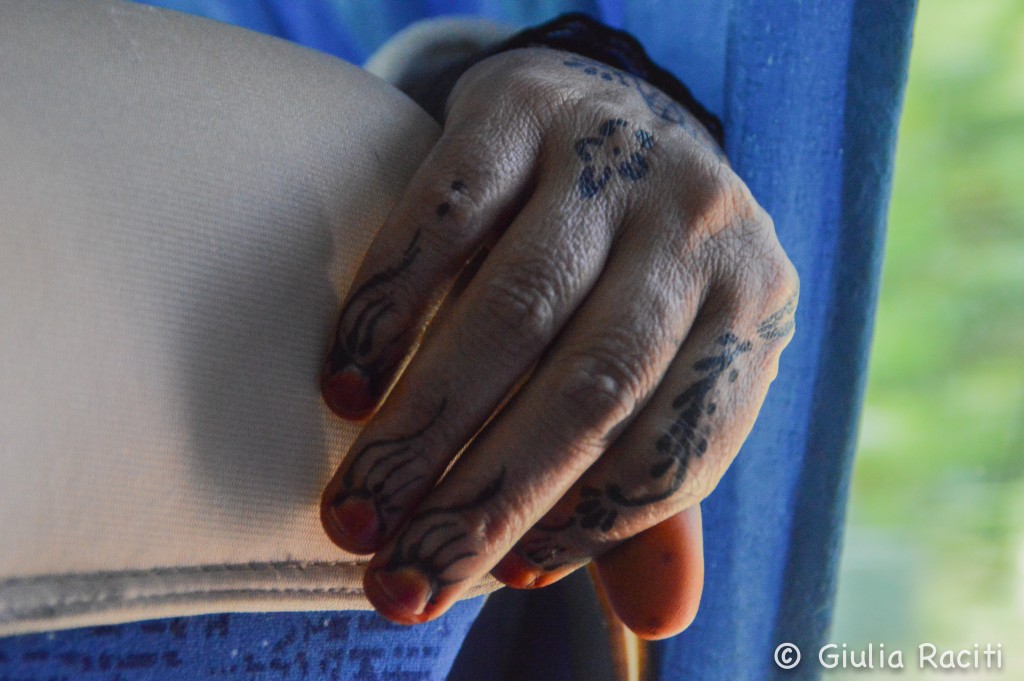
10 hours or more actually, through the highlands and along streets dotted with small villages consisting of a few huts, the first huts of my life, we stop for lunch somewhere, I don't know where.
For some reason I feel uncomfortable, this time I'm really alone. Totally alone, in a totally black world I still don't understand and, I guess, don't feel ready for.
When an elegant woman gets out from the bathroom, I do something I have never done before, I asked her, "Do you mind if I stay with you?"
I didn't know yet that Africans have a strong sense of community that, from now on, would have been the leitmotiv of this experience that happened again in other African Countries I have traveled to.
"Come with me, we're all going to eat."
By "all" she meant a table of 15 people sharing 5 injera.
I have been invited to eat with my hands from the trays. We were almost ready to leave again and before getting into the bus they offered me lunch ending with an unexpected invitation, shortly before climbing on the bus to take our places, "We would like to invite you to a ceremony tomorrow night. Are you coming? ".
The only ceremony I know in Ethiopia is the coffee one. I Agree.
Before getting off the bus once we got to Harar she reminds me about the event they want me to go to,"Tomorrow at 8pm we come to pick you at the hotel."
24 hours later, the ceremony I thought was a coffee one, turned out to be a wedding and I was the special guest of this event to the point of remaining seated between the spouses during the marriage party.
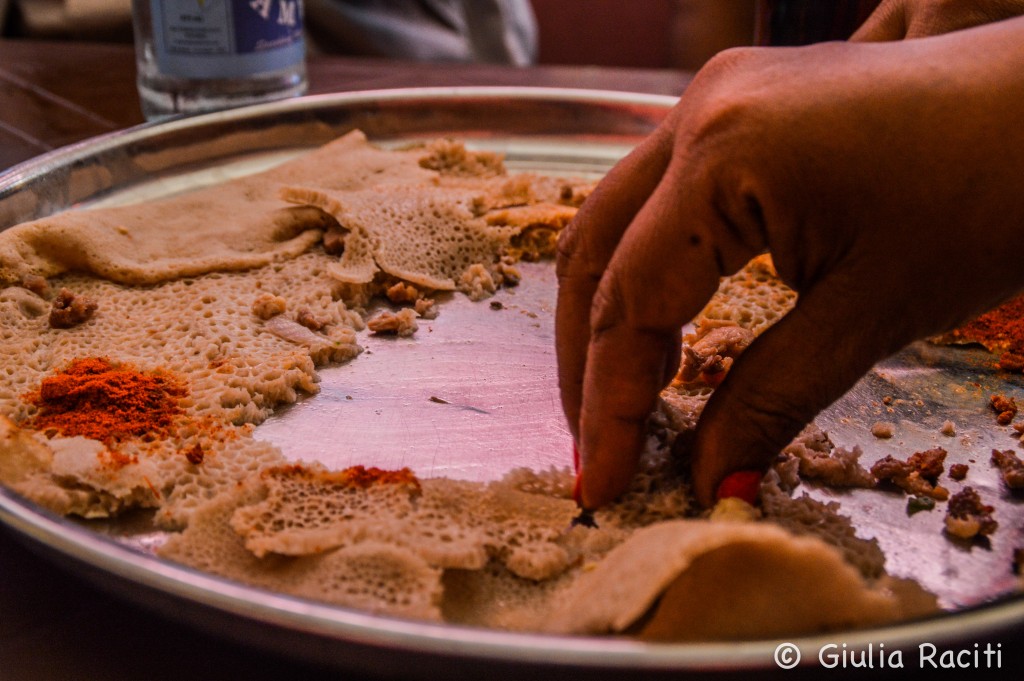
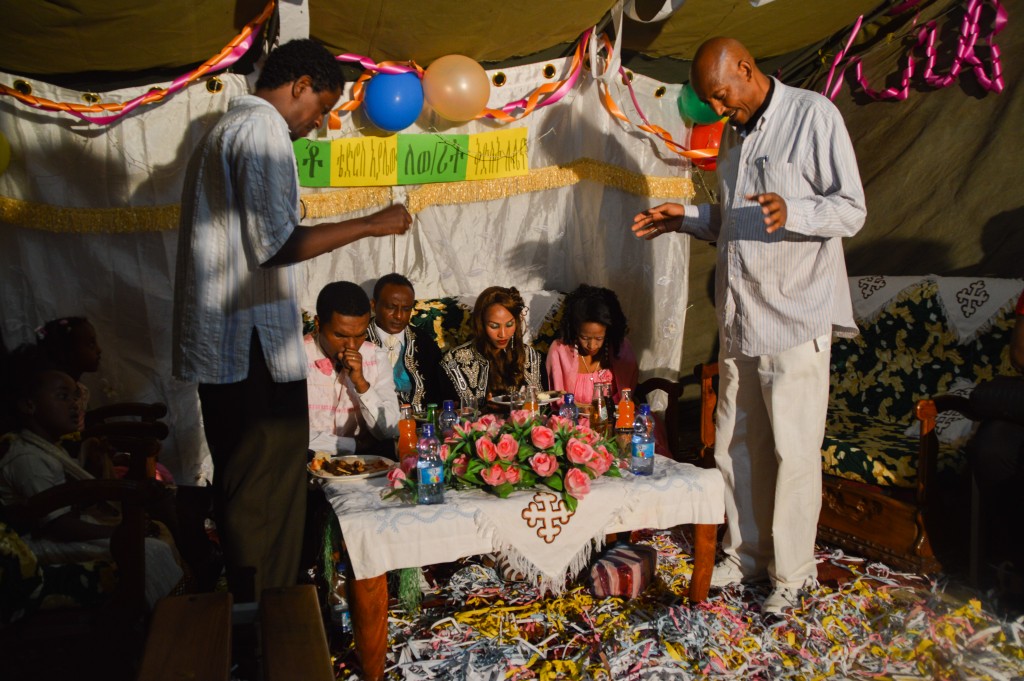
I am in Harar, the Forbidden City , the fourth holiest city in the Islamic world and the most important center of Islamic traditions.
A special place that tells us a different Ethiopia, as if Ethiopia with its 83 languages, 230 dialects and the many ethnic groups didn't make this thing pretty clear already.
Harar is fascinating and charming with winding streets, colored walls and Indian architecture buildings.
Harar the city where Rimbaud lived, nowadays his house is a museum, is a Muslim enclave in a predominantly Orthodox country that today can still be described, as used to do the explorer T. Burton, as "a paradise populated by asses".
Known as the Forbidden City , until 1885 non-Muslims people were not allowed inside the walls, the same Burton entered into it by disguising themselves as Arab, today is a city with an islamic soul that, more than Ethiopia and black Africa, seems to take us to the streets of the imperial cities of Morocco, with its 99 mosques, public and private, 100 QUBI (graves or shrines of holy men) that also give the nickname "city of saints", gey Ada.
If, within the walls that enclose the old city that can be accessed from six gates, is predominantly Muslim, immediately outside the gates the predominant religion seems to be Orthodox.
An interesting site that explains the socio-cultural-religious complexities of this Country where I can breathe full integration between different religious and a very interesting social tolerance from which seems,instead, we globally are gradually moving away.
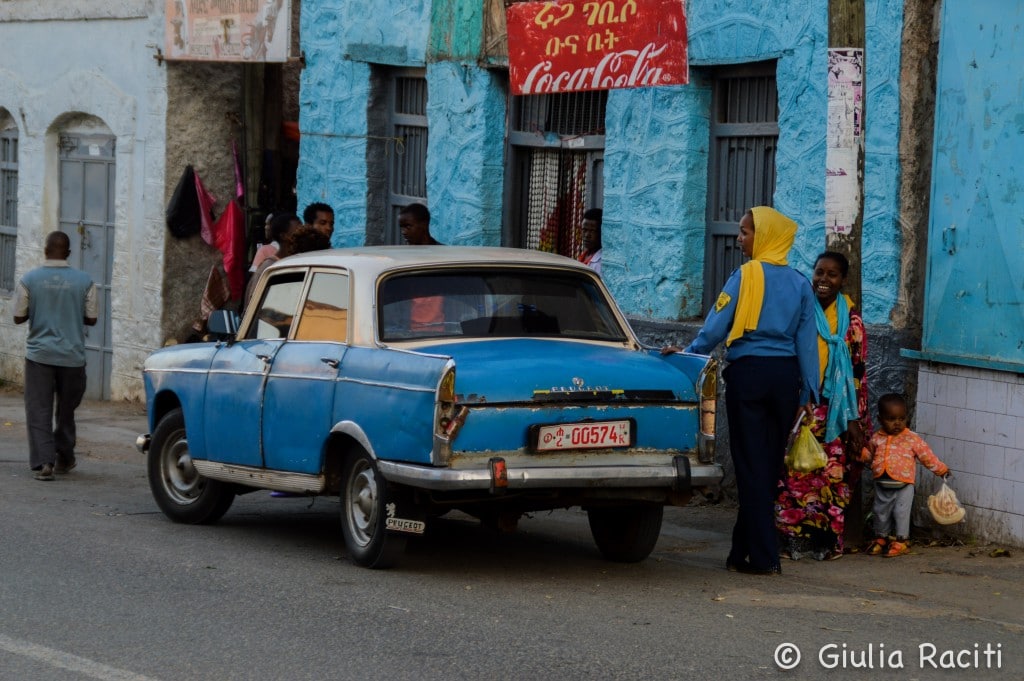
The main attraction of Harar is the city within the walls, high 5 meters that count 6 gates from where we can access inside.
Enclosed into this are there are about 22,000 people living and there are about 5500 houses, I recommend to sleep at least one night into the typical harari house, unique in their distinctive decor.
The old town reminds me of the Moroccan cities, Fez or Marrakeck, small labyrinthine alleys where it's highly recommended to pay a guide to walk around, or there is the risk to miss the most charming corners. No danger in doing it yourself anyway .
The front and main door is the Harar Gate , the other ports are: Showa gate, Buda gate (interesting because here work the blacksmiths, just follow the noise to find it), Sanga Gate , Erer Gate and Fallana gate.
In one day you can visit the old city of Harar, walking, partly because cars don't drive in the center, reaching Feres Megala, passing through the market, Gidir Market, which sells the famous coffee of Harar, the tomb of the Emir Nur, the Jami mosque, the tomb of Sheikh Abadir, which apparently was the one who introduced Islam in the city and replacement location for those who can not travel to Mecca, the home of Rimbaud, and the tomb of Sheikh Said Ali Hamdogn.
A pleasant walk in the city that shares with Ethiopia the chaos and lack of order but that reveals a different look from the rest of the country too.
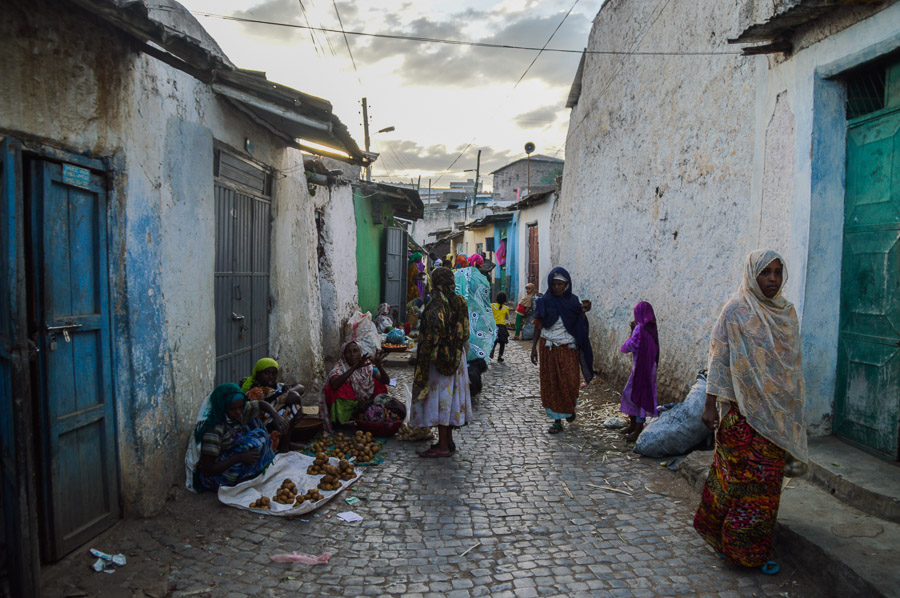
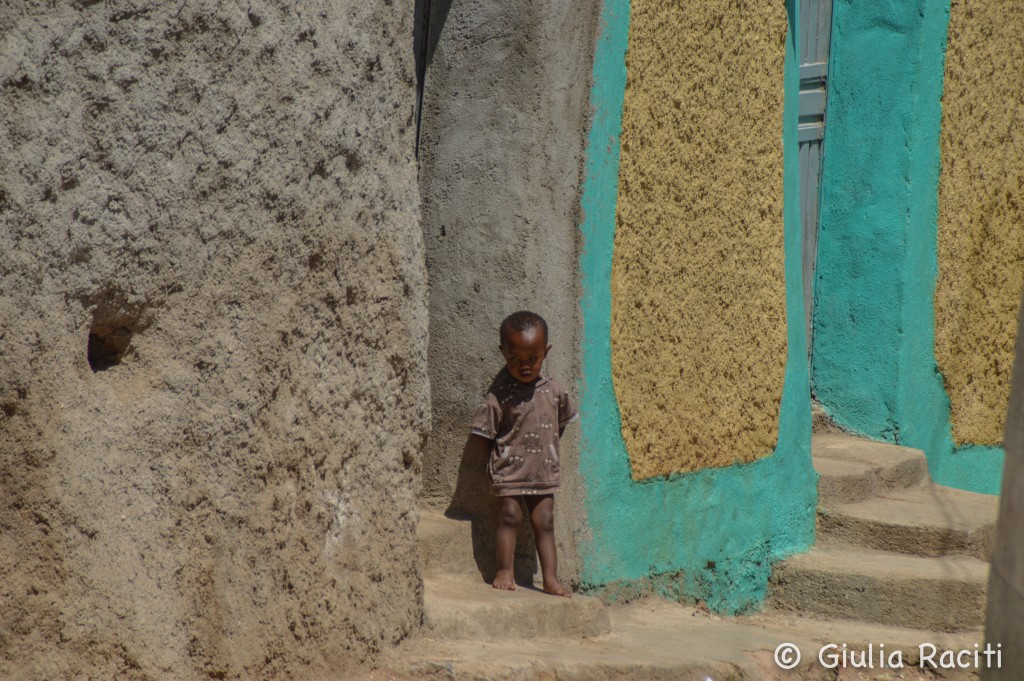

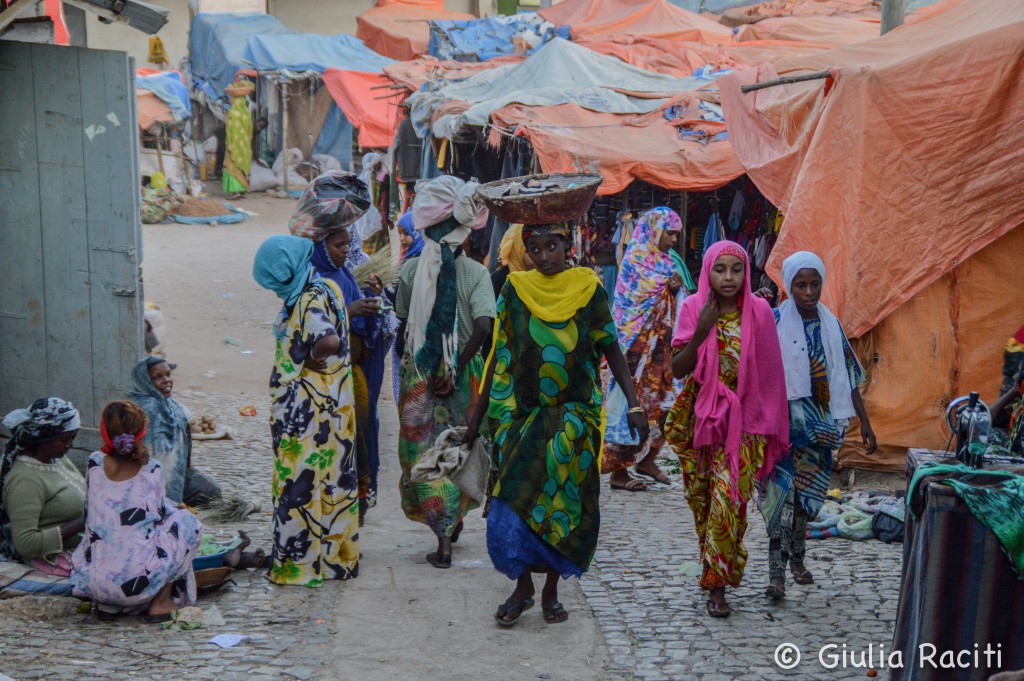
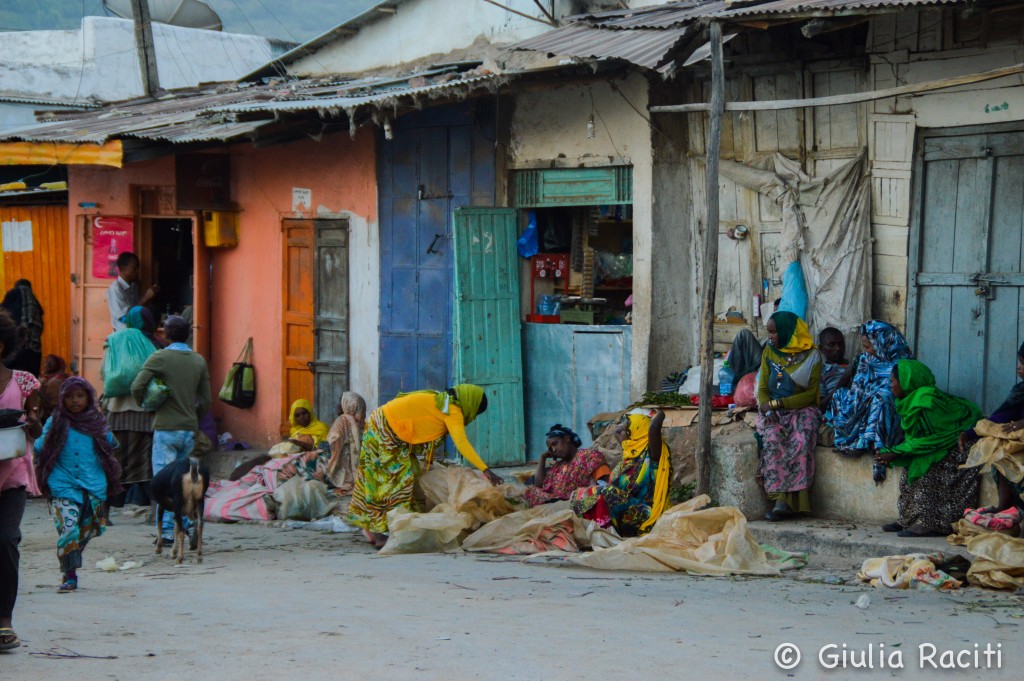
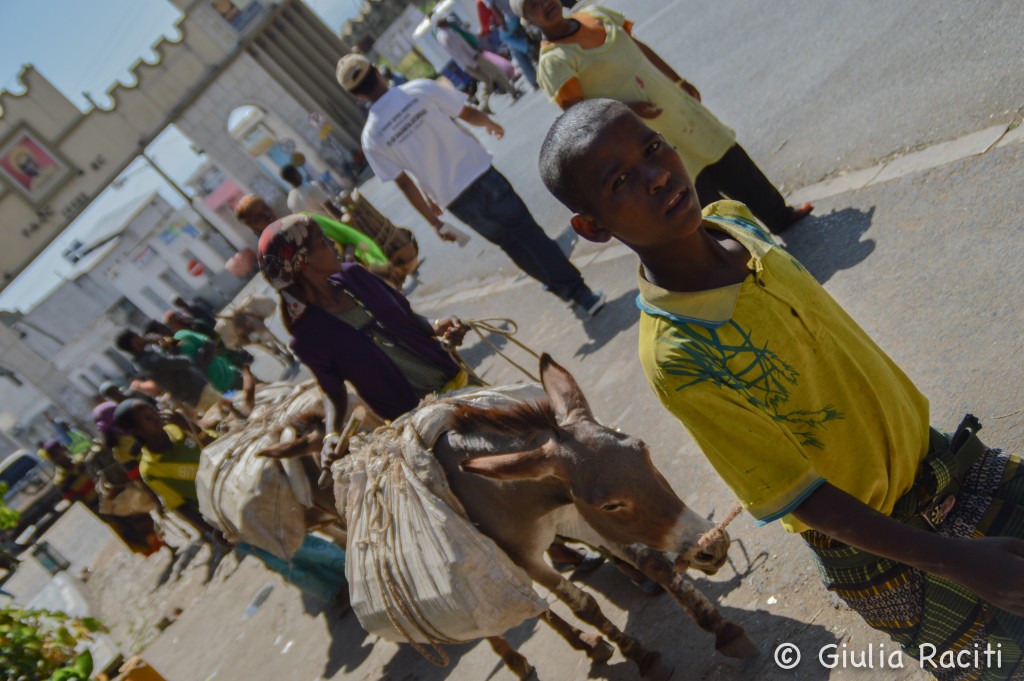
About 30 kilometers from Harar, an hour and a half of minibuses, zipping through the streets dodging animals, cows and sheep, walking in the middle of the streets like it is just of them, I reached with Alem, my friend and trusted guide of Harar, Babile famous for the camel market, on Monday and Thursday, and the general market on Saturday. Within walking distance from the Valley of Wonders, known for its big rocks in balance that seem about to fall.
The camel market, where the typical somatic features of Ethiopians leave rooms to the Somalis, along with Addis's Merkato is one of the places that most impressed me in the world.
I love markets and i have seen hundreds but this is a really special one!
Thousands of camels scattered in a huge field, rifles and trading among Somali's huts, just beyond the field, and a lot of chat.
An immersion in a world chaotically new that, at the same time, was amusing and scaring me.
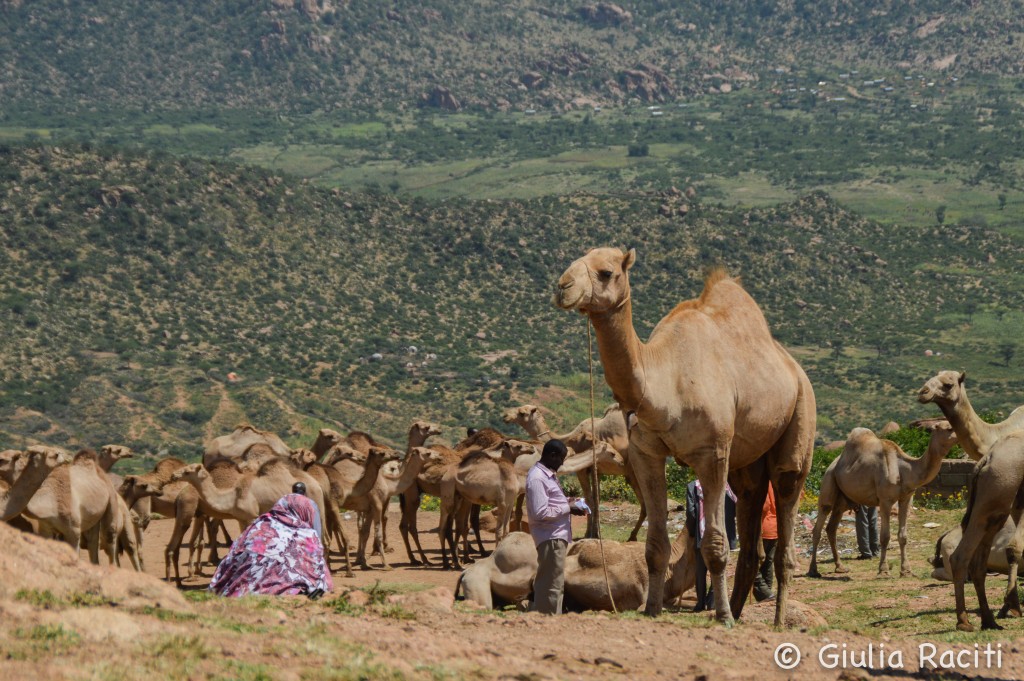
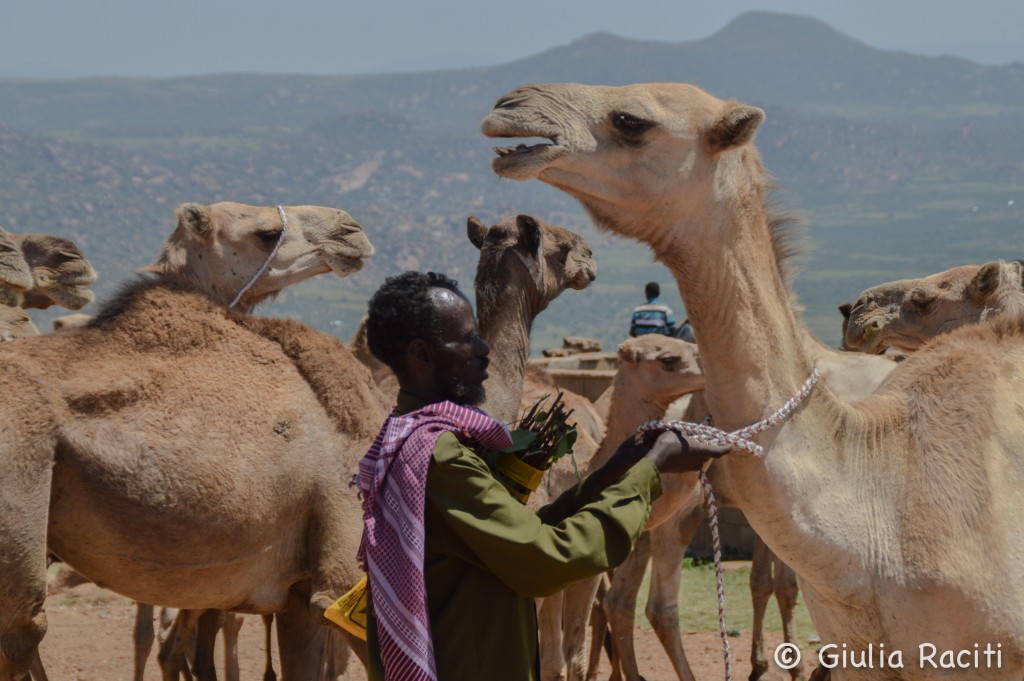
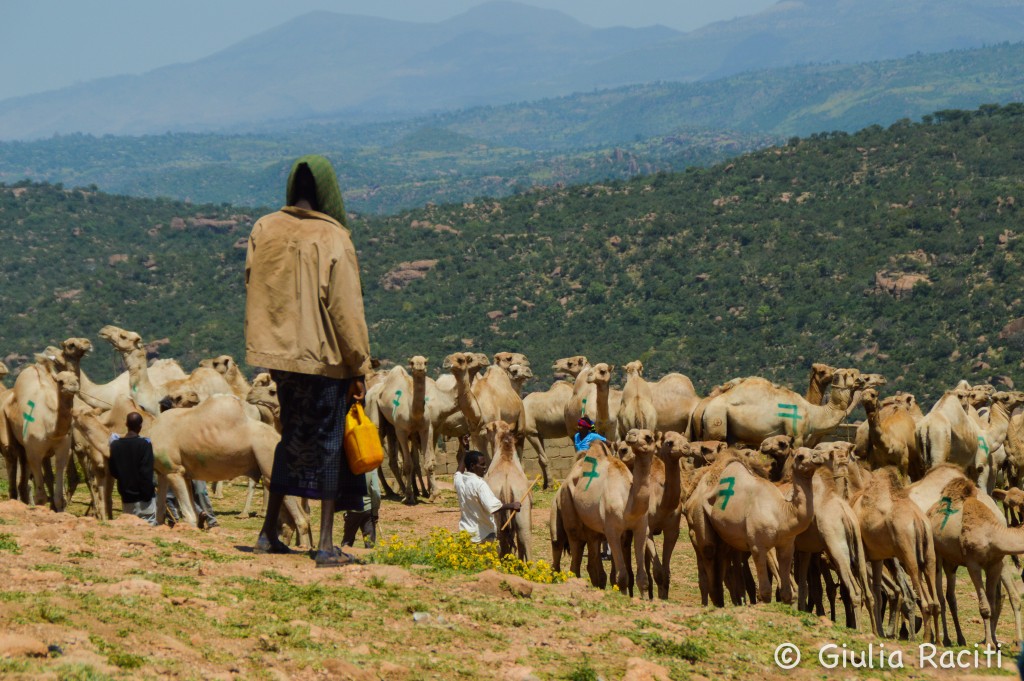
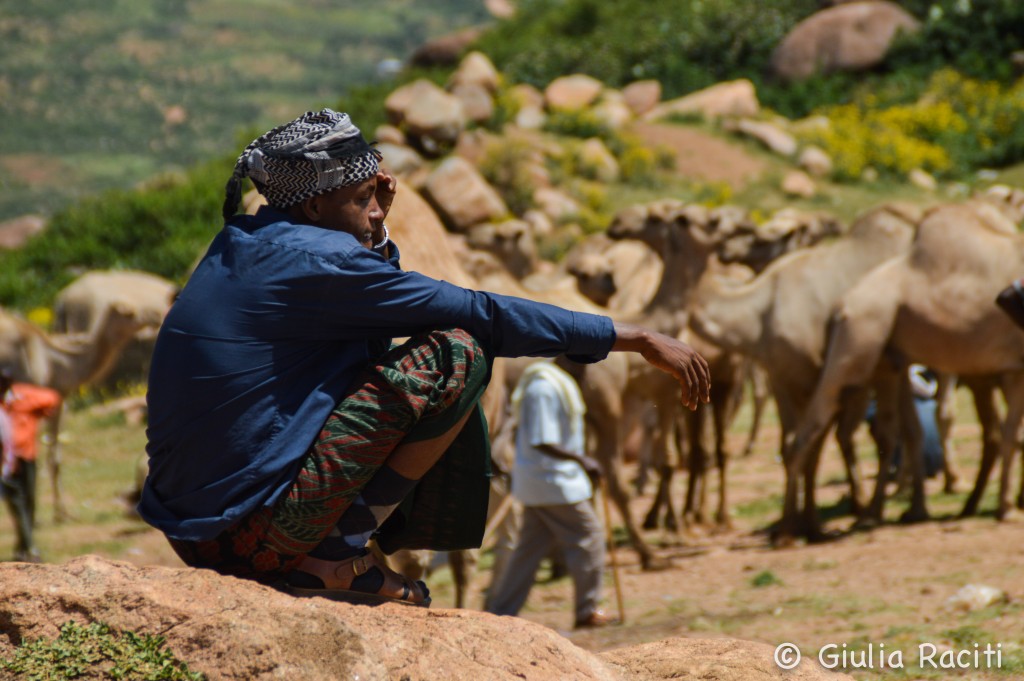
Mainly in this part of Ethiopia, although Harar is considered a holy city, there is something new in the social habits I have discovered.
I am talking about the habit ofchewing the Khat, or qat, an arabic word that means shrub, a plant native to the eastern regions of Africa, most likely in Ethiopia but also widespread throughout the Arabian Peninsula.
The leaves of this plant, who are bitter and a little disgusting for my taste, contain the action alkaloid stimulant that apparently generates states of euphoria and excitement, but it's also addictive.
To sweeten the bitter taste of it is often offered, if it is invited to the home of people Harar, as has happened to me, with peanuts or 1 or 2 teaspoons of sugar.
Harar's market is plenty of stands selling the leaves but not far from the city if you want to experience a crazy weird market then you should drive till Aweday which is famous throughout the area for the night Khat market in which the only thing that sells is this leaf.
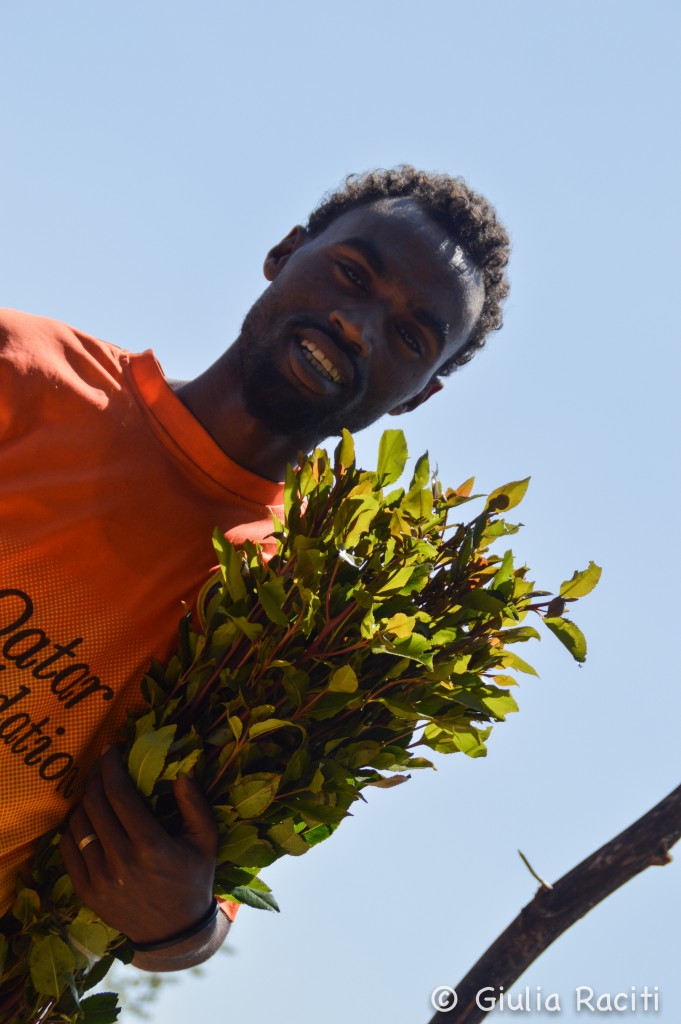
We go down in altitude and get to Dire Dawa, the second largest city of the country after Addis Ababa and that thanks to its strategic position has always been an important way for businesses and trading.
The city is divided into two parts: Kezira, and French colonial architecture and Megala, the Muslim area characterized by small corners and an interesting market.
You can get to Dire Dawa to Harar with the minibus and this visit can be done in a day or you can stay a few days. Personally I preferred to keep the base in Harar but this city is worth a visit.
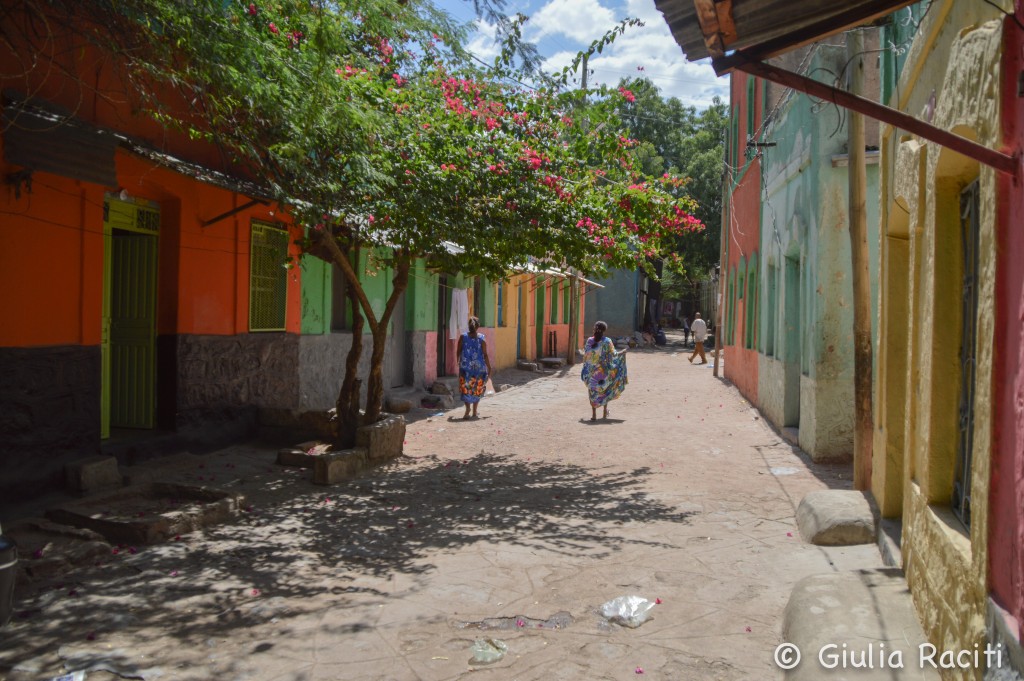
The ways to get to Harar from Addis are mainly 2, bus or flight that lands at the airport in Dire Dawa.
For those who flew to Ethiopia with Ethiopian Airlines, domestic flights can be bought with considerable discounts, alternatively you have to pay full price.
From Dire Dawa to Harar you can take a minibus which takes about one hour to get into town.
Alternatively you can take a bus from Addis Ababa. Here they will go at 4.30 am but the bus probably will not leave before 6am.
The cost is around $18, the bus travel only during the day time, throughout Ethiopia there aren't night buses because roads can get too dark and dangerous.
The best companies are Skybus and Selam bus, the journey takes about 10 hours with a lunch break at a local restaurant along the way.
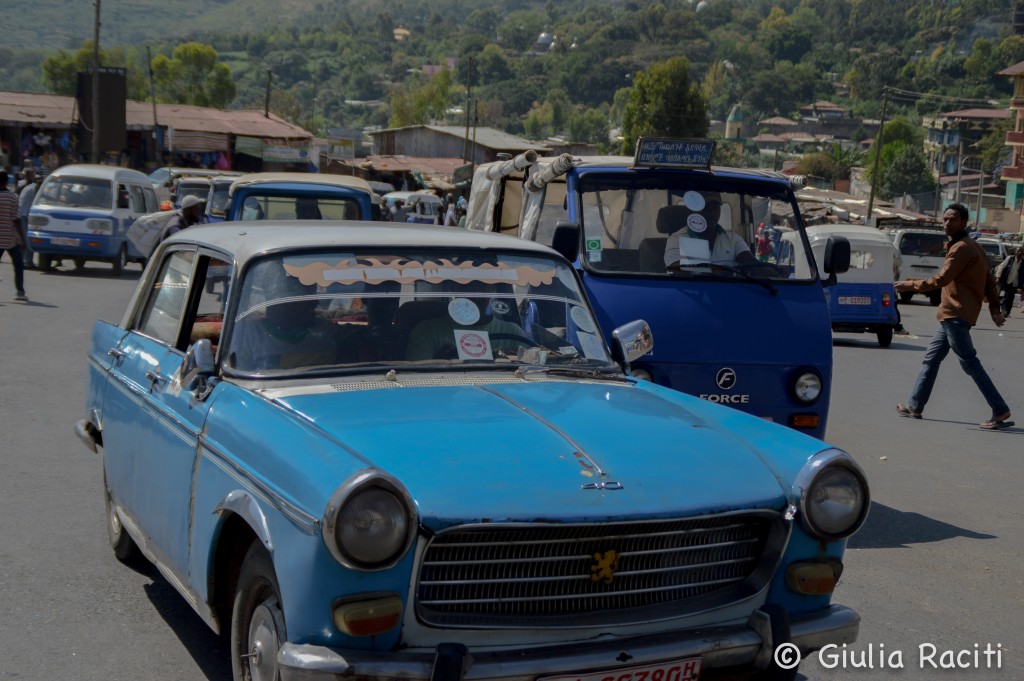
Una ottima guida di viaggio è la Ethiopia della Bradt Guide, disponibile solo in inglese ma assolutamente ben fatta a differenza della Lonely Planet che mi è parsa scritta da qualcuno a cui non è piaciuto il Paese. Se puoi leggere in inglese quindi compra senza pensarci troppo la Bradt Guide, se leggi sono in Italiano la Etiopia, Gibuti e Somaliland della Lonely Planet è l'unica alternativa a cui devo dare il merito di ottime sezioni sui trasporti (che in africa sono comunque da prendere sempre con beneficio del dubbio.
[tg_promo_box title="" border="" shadow="0" button_text="" button_url=""]There is a special person who has accompanied me on this trip to Harar helping me to become an integral part of the local community by opening the doors of her home, cooking for me and welcoming me with devotion typical of a sister who doesn't see you for long time.
Thanks Alem.
If I loved Harar that much it was because her and her friends that have been looking after me, even when I was down and thought, for a second but I did it, I wasn't able to accomplish my trip into this intense and difficult to swallow Country.
Thanks to her I will remember this city as one of the most special and friendly places in the world.[/tg_promo_box]
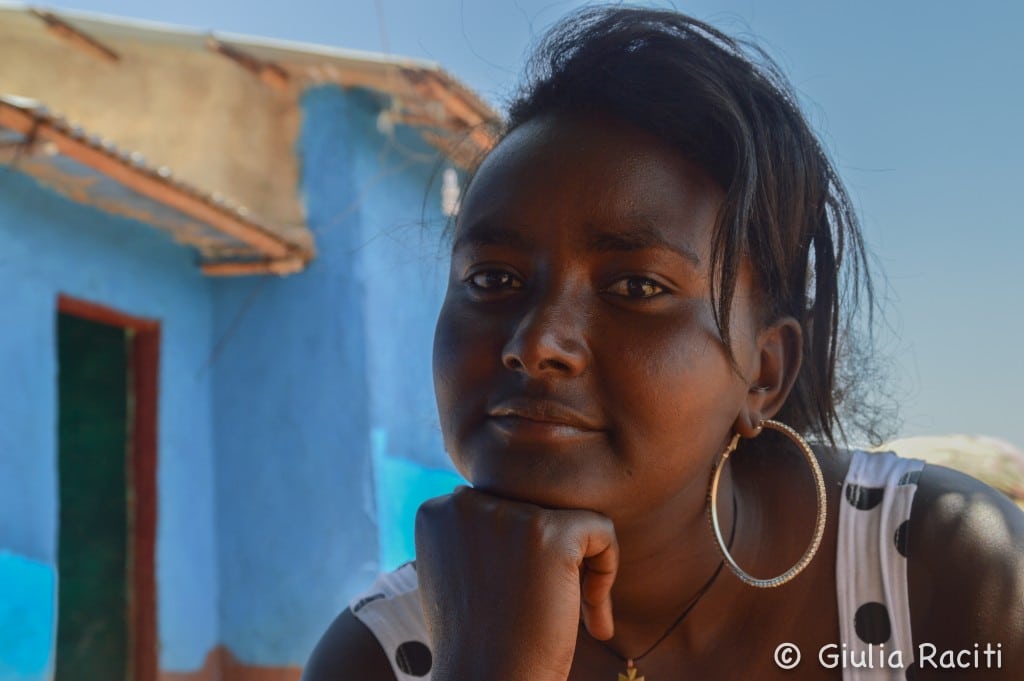
La mia amica Alem
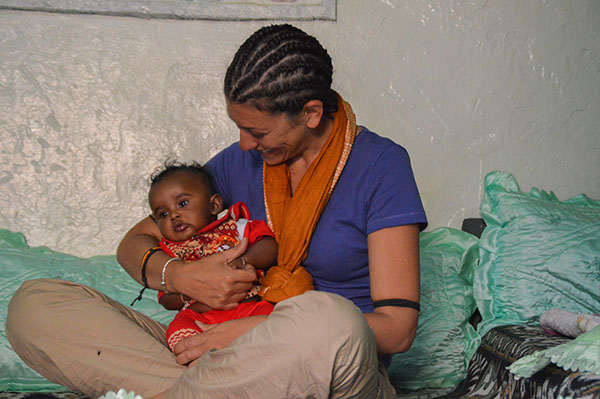
Io con il figlio di Alem
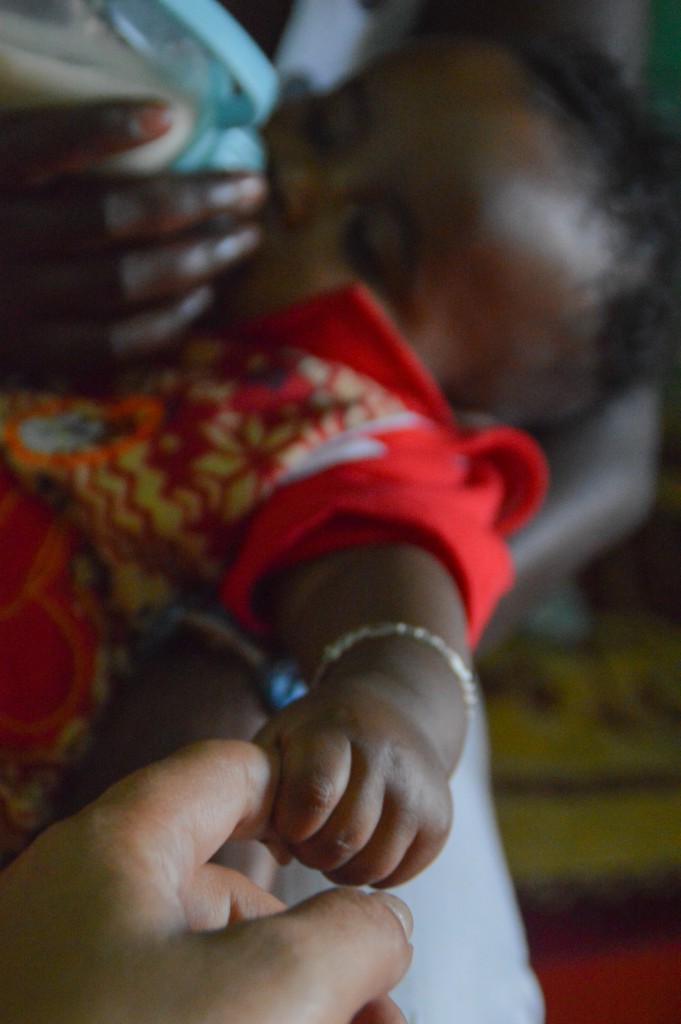
[su_box title="Travel to Ethiopia with local Operators" style="soft" radius="5" box_color="#2a3cf6"] Do you want to organize a trip to Ethiopia with local operators that offer reliable and customized travel solutions tailored?
Send us an email to [email protected] indicating:
Within 48 hours you will receive an email with a proposed itinerary. Your Travel Consultant will help you think a tailor made itinerary to make real this dream trip of which we guarantee an excellent price performance.
[su_button url="mailto:[email protected]" target="blank" style="soft" background="#2a3cf6" size="5" center="yes" icon="icon: envelope"] Enquiry [/su_button]
[/su_box]
Disclaimer: In questo post, alcuni dei link forniti sono link di affiliazione, il che significa che posso guadagnare una commissione se si effettua un acquisto attraverso questi collegamenti. Tuttavia, ciò non comporta nessun costo aggiuntivo per te. Le commissioni che ricevo attraverso questi link di affiliazione aiutano a finanziare e supportare il mio blog, mantenendo così la sua indipendenza e la mancanza di sponsorizzazioni. Mi sforzo sempre di fornirti le migliori informazioni e consigli possibili, basati sulla mia esperienza e ricerca personale. Mi preme sottolineare che il tuo sostegno è fondamentale per mantenere vivo questo blog e continuare a fornirti contenuti di qualità. Grazie per il tuo supporto!
Alcune immagini pubblicate sono state tratte da Internet, nel caso in cui, il loro utilizzo, violasse diritti d’autore, mandateci una mail a [email protected] e verranno immediatamente rimosse.
This was really interesting! I am planning to travel to Harar next month - do you have a contact for the local guide you were with?
Hello Danielle,
unfortunately not anymore. My friend Alem, that was also a fantastic guide passed away a few month ago and she was my only, and trustful, contact in Harar.